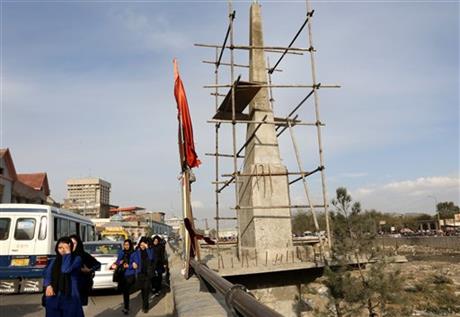KABUL, Afghanistan (AP) — Suspected Taliban fighters stoned a 22-year-old Afghan woman to death after she was accused of adultery, an Afghan official said Wednesday.
The woman, identified only as Rokhshana, was forced to stand in a deep hole in the ground during the Oct. 24 attack in a village in remote Ghor province of western Afghanistan, said Abdul Hai Khateby, the spokesman for the governor.
The village, about 45 kilometers (28 miles) north of Ghor’s capital, Firozkoh, is controlled by Taliban insurgents “who implement their own barbaric laws,” Khateby said.
In an online video purportedly showing the killing, about a half-dozen men are seen standing around a deep, narrow pit and pelting the woman with rocks while a larger group of men sit on the ground nearby, watching. The video could not be independently verified.
Afghan President Ashraf Ghani called Rokhshana’s killing a “criminal and un-Islamic” act, according to a statement from his office. The statement said Ghani had appointed a “delegation” to investigate the incident and report to him personally.
While Ghor officials blamed the Taliban, the 14-year war in Afghanistan is often used as a coverall for a wide range of criminal behavior, including revenge killings, kidnapping for ransom and extortion.
The war has entrenched traditional and religious values in many parts of Afghanistan’s vast rural hinterland. Although stoning is illegal under the Afghan constitution, it is seen as a legitimate punishment under Islamic law, or Sharia.
Incidents of stoning are unusual but not unheard of in Afghanistan, where women are the main victims.
“This is not the first such incident and it won’t be the last,” said Silai Ghafar, spokeswoman for the Solidarity Party which advocates for women’s rights.
Khateby, the Ghor governor’s spokesman, said Rokhshana had been captured by the insurgents after she ran away from home, purportedly with a 19-year-old boyfriend. The Taliban tried them in their Islamic court and pronounced the pair guilty of having sex, the spokesman said.
Rokhshana, who the Taliban said was also guilty of running away from home, was accused of adultery because she was engaged to man she did not want to marry, Khateby added. She had already been divorced, he added.
Under the 1996-2001 Taliban rule, girls were barred from attending school, women were forced to stay indoors, and to cover their heads and faces with burqas when they left their homes, which was permitted only in the company of male relatives. And though women in Afghanistan have won back many of the rights since then, deep prejudices remain — along with fears that their rights could be sacrificed in any government peace deal with the Taliban.
In March, the brutal killing at a Kabul shrine of a 27-year-old woman known as Farkhunda — who was beaten to death by a mob of mostly men enraged over false accusations that she had burned a copy of the Quran, then thrown off a roof and ultimately set on fire — sparked protests in Afghanistan and reverberated around the world, highlighting the brutality women face in the country’s conservative society.
The death sentences for four men convicted of her killing were overturned in July by an appeals court, which commuted them to 20 years in prison for three of the suspects while the fourth was sentenced to 10 years. The decision enraged civil society activists, who saw Farkhunda’s death and the subsequent treatment of those accused of killing her as indicative of a lack of justice for Afghanistan’s brutalized women.
The Solidarity Party last week erected a monument to Farkhunda by the spot on the Kabul River bank where she was killed.
Ghafar, the party spokeswoman, said the monument aims to “remind the next generation of this incident, so that what happened to Farkhunda never happens again.”
___
Associated Press writer Rahim Faiez in Kabul, Afghanistan, contributed to this report.

